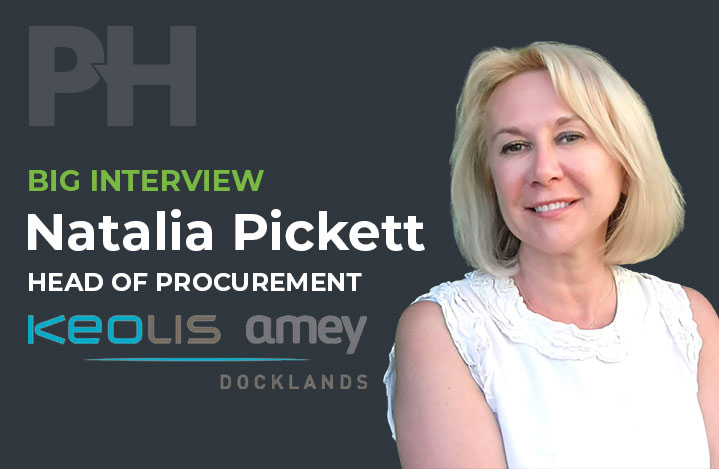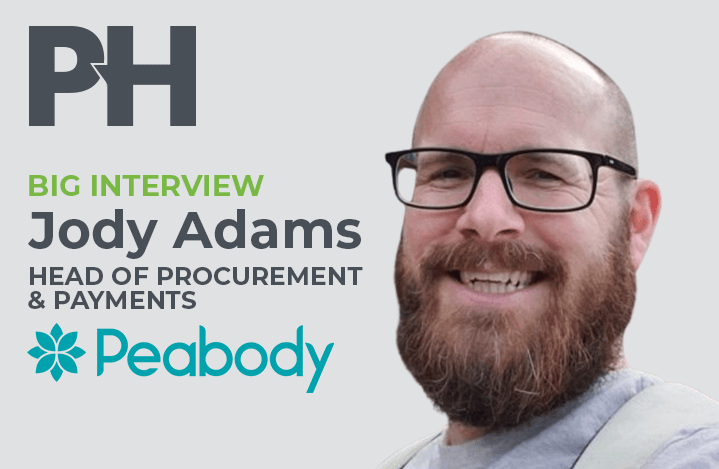For this week’s Big Interview, Dan Goodson, who heads up Procurement Heads‘ Industrial sector, spoke with Natalia to hear more about her career and what the team is doing around sustainable procurement.
How did you get into procurement?
You have probably heard this answer a thousand times, to be honest, I have never met a person who dreamed to be a Procurement Director from childhood.
I met a lot of people who wanted to be doctors, policemen, and even salespeople but not procurement.
All the procurement people I know ended up in procurement accidentally.
A million years ago I graduated in computer science and artificial intelligence, so I used to be very clever! Then I was a lecturer at my university then I moved to computer services and logistics, then into computer procurement, then general procurement and this is my journey.
What are you most passionate about when it comes to procurement?
I was always passionate about it; when people talk about procurement as a money-saving function this makes me sad because it is not who we are and it is not what we do.
We are matchmakers if you will between internal clients and suppliers.
When this relationship is established then efficiencies, innovations and savings will come up naturally.
We are fundamentally not about money-saving.
Very rarely is savings the prime function of procurement, it is more about relationships.
When you are hiring what do you look for?
Personality, a very good foundation of education to make skills transferable.
Experience and a good analytical approach to every task; to break tasks down, analyse and combine them and then come up with a solution, or solutions, that you can discuss with internal clients and suppliers. This person needs to be as charming as I am!
What do you think are the current procurement trends and what emerging roles do you think we will see as a result?
I am happy that now it is less about savings and more about building partnerships and relationships with suppliers.
In terms of new roles, I think it should be something like Supplier Success Manager, it should be a person who manages these relationships making sure it is fruitful for both parties.
Because suppliers are specialists in their areas and we are specialists in our area, only through a combination of best industry practices from both sides will we find the best product or service or solution for both of us and it will be educational for both parties.
This is why I think new roles in procurement will be about managing these relationships.
Tell us about your best and worst business decisions.
In procurement whenever you make a decision it is always a business decision, we facilitate the decision-making process.
Our best and worst decisions are all about taking risks and following the process.
In terms of the best decision, very often we invite suppliers without rail industry experience to participate in our tender because it is part of the process.
Twice suppliers without rail industry experience have won the tender.
Because we deliberately eliminate the topic of rail industry experience from the evaluation process.
The first time this supplier won I was panicking because it was a bit risky!
But we followed the process and it was a major success; we built true partnerships and developed new products. The supplier and internal client are very satisfied with the results so it was very good.
In terms of worst decisions, we have established a sourcing process but the metrics were built in such a way that half of the scoring is with commercials. This particular supplier was very cheap and won the tender and we bitterly regretted that because they couldn’t perform as we expected and had contracted them to.
Now we are trying to rectify the problem but we learnt a lesson from that.
What has been the best lesson you have learnt in procurement?
Probably here I need to repeat our procurement mantra – it is honesty, transparency and an open mind.
Without this, you will never build relationships with suppliers and internal clients.
Bashing them over the head and telling them what to do because you know better will not work.
You need to build relationships through honesty, transparency and open-mindedness.
What impact has Covid had on your organisation?
It changed our way of working but from a procurement perspective, there weren’t any changes (to the organisation).
It probably sounds very boring but for example, our IT system was already 100% ready for us to work from home so we didn’t have any issues.
From a supply chain perspective, again, because we had built this good relationship with our key suppliers, we had a lot of extra work done and didn’t have any shortages.
So, the short answer is no changes from a supply chain perspective.
What are your team doing in regards to sustainable procurement?
It is complicated.
I have spoken with many procurement people about the definition of sustainability and every time the definition will be different, it depends on the industry and the company and the way of working.
I’m not saying that it is right or wrong, it is just different.
For us, sustainability is safety first, and whatever I purchase should be safe.
It should be fit for purpose, supply should be uninterrupted and then it should be environmentally friendly, we should think about local communities.
Is it something you have a scorecard against in terms of suppliers?
Yes, it is all part of the formal process of course.
It is part of our metrics for tenders, all of it.
It is a pretty standard and, I would say, boring approach but for me sustainability, it is more emotional.
It is about partnership; it is about relationships and making sure we are doing the right thing in terms of ethical procurement and in terms of climate change.
We are an electric railway and in theory, we are green but still, we can do lots more to be greener than we are.
This is what we do, tick boxes formally and we have a lot of systems of checking suppliers. We check them as much as we can but 99% of my suppliers are European – the chances that they use child labour or modern slavery are very small but how ethical their procurement is, is not a tick box exercise. We do this but it is not the prime task of it.
We have all the scorecards and we follow the process religiously, but on top of that, it is about feelings.
How do we feel about each other? Do we trust each other?
This is where sustainability is for me; if a crisis happened from a supply chain perspective, we are fine because we built this sustainable relationship.
What do Equality, Diversity and Inclusion mean to you?
A lot.
Firstly, I am a living example of ED&I because I arrived in this country when I was 38 years old, my English was even more broken then than it is now and I thought I knew everything about procurement but I didn’t.
Quite a few people helped me massively at the beginning of my career. For example, Andy Palmer in Shell – it was my first job here in the UK. Then Simon Gibson in Network Rail gave me my first permanent opportunity.
Why these guys believed in me – God knows but probably they saw something in me. 15 years ago I doubt if they did it for Equality and Diversity, this wasn’t a thing at that time but I think they believed in me and they believed that a different view and perspective will help an organisation and I believe I proved them right.
Giving people an opportunity is very important.
What involvement do you have both personally and professionally in ED&I?
I am a member of Women in Rail and Women in Transport and I am also a mentor for Women in Transport.
I don’t believe that women are in a disadvantaged category in terms of ED&I.
I believe we need to help whoever needs this help. We have these programmes and I am absolutely happy to help in terms of mentoring; I think I have enough experience I can share with girls who want to achieve whatever they want.
Why do you think those programmes are important?
Because it gives people opportunity.
I am not forcing girls to do something they don’t want to do but (rather) telling them that with the right attitude anything is possible for them.
What do you like to do in your spare time?
A lot of things!
I have a husband, daughter and two cats!
In my spare time, I enjoy walking, hiking and travelling.
What advice would you give your younger self?
Learn languages!
Now I have started to study German, it is very hard when you are 100 years old!
I am trying to entertain my brain a little!
Tell us an interesting fact about you
I have a degree in artificial intelligence but also because I graduated from a railway university in Moscow, I spent a summer as a train attendant.
It was an eye-opening experience. It was very interesting and now I have completed this circle of industry, I started in railway and now I am back in railway.
I worked for gas and oil, FMCG, pharma and lots of different organisations – now I am back in railway.
Somebody once asked my husband what his wife did for a living and he said shopping, on an industrial scale.
He was kind of right because if you can imagine your thought process when you are buying stuff in B&Q for your DIY project, you will check what you want and check with your wife what you need and check your budget, you’ll talk to you friends (internal market research) and then somehow you will come up with a strategy of what you need to buy so yes it is industrial-scale shopping – and I love it!






